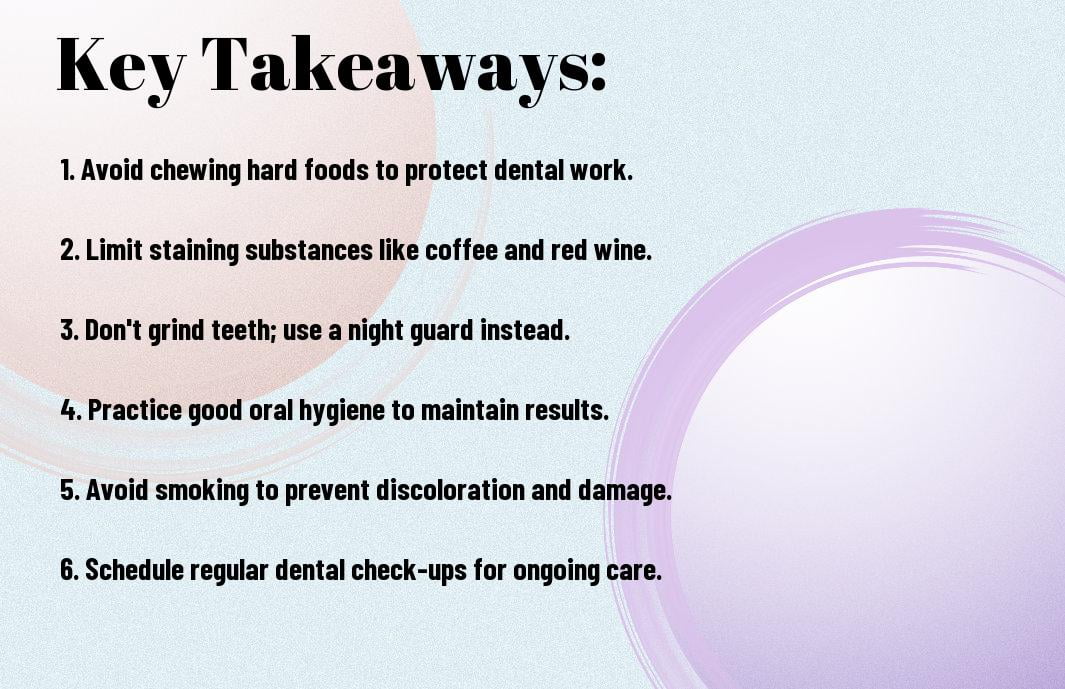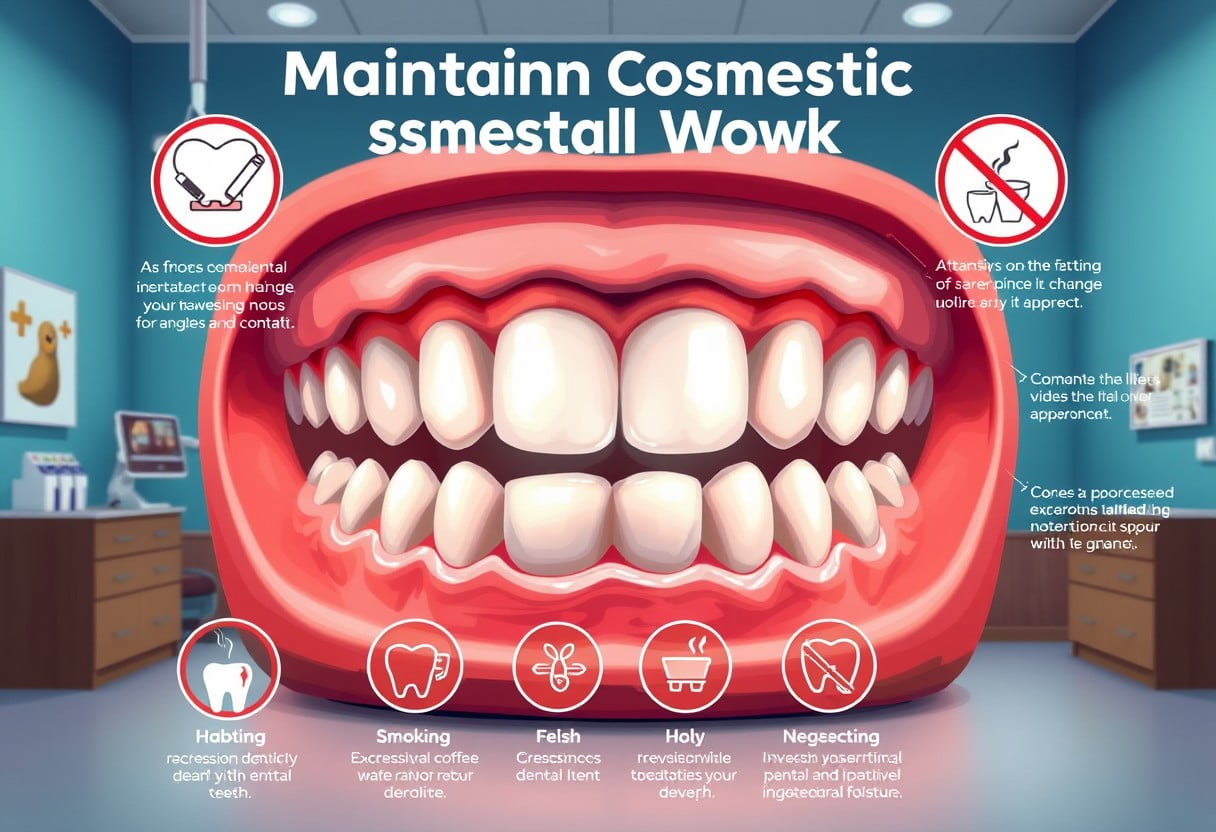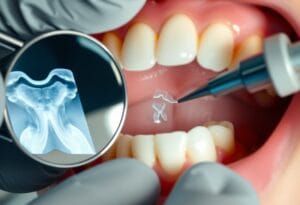Habits play a crucial role in maintaining your cosmetic dental work and preserving the results for the long term. By avoiding certain detrimental behaviors, such as grinding your teeth or consuming hard or sticky foods, you can significantly enhance the durability of your procedures. Additionally, neglecting proper oral hygiene can lead to complications that undermine your investment in a beautiful smile. Being informed about these risks will empower you to make choices that safeguard your dental enhancements, ensuring that your smile remains both healthy and radiant.

Understanding Cosmetic Dental Work
Before exploring into the specifics of cosmetic dentistry, it’s necessary to grasp what this field encompasses and why it has grown in popularity over the years. Understanding cosmetic dental work will empower you to make informed decisions about your dental health and the aesthetic enhancements you may wish to pursue.
Definition of Cosmetic Dentistry
Dental cosmetic dentistry refers to a branch of dentistry focused primarily on improving the appearance of one’s teeth, gums, and smile. This type of dentistry not only addresses cosmetic concerns but can also play a role in enhancing your overall oral health. Through various procedures, cosmetic dentistry aims to correct imperfections such as discoloration, misalignment, and structural imperfections.
In essence, cosmetic dentistry combines artistry and dental science to provide treatments that result in a more aesthetically pleasing smile. Whether you are looking for subtle enhancements or complete transformations, cosmetic dentistry offers a tailored approach to meet your individual needs and desires.
Common Procedures
To help you achieve the smile of your dreams, cosmetic dentistry encompasses a variety of common procedures. Some of the most popular treatments include teeth whitening, veneers, dental implants, and orthodontics. Each of these treatments offers distinct benefits tailored to specific aesthetic goals, assisting you in your journey toward a more confident smile.
Understanding the common procedures within cosmetic dentistry is crucial for selecting the best option for your dental needs. For example, teeth whitening is designed to brighten your enamel, while veneers can mask imperfections and reshape your teeth. Dental implants provide a permanent solution for missing teeth, and orthodontics can address alignment issues. Each procedure can offer unique benefits, making it vital for you to consult with a qualified cosmetic dentist.
Importance of Maintaining Cosmetic Results
With cosmetic dentistry, the journey doesn’t end once your procedure is complete. It is crucial for you to maintain your cosmetic results to ensure longevity and satisfaction. Engaging in a proper oral hygiene routine, regular dental check-ups, and taking preventative measures can help you preserve the aesthetic enhancements achieved through cosmetic work.
Moreover, maintaining these results contributes to your overall health and well-being. Your investment in cosmetic dental work can enhance your self-confidence and social interactions, but it must be supported by diligent care to avoid the risks of deterioration or complications.
For instance, neglecting your dental hygiene can lead to gum disease, which may jeopardize the stability of cosmetic enhancements, such as veneers or crowns. By prioritizing your oral care, you not only protect your investment but also enhance the longevity of your results.
Habits to Avoid
Some habits can fundamentally undermine the effectiveness and longevity of your cosmetic dental work. These behaviors not only damage your teeth but can also lead to expensive repairs and complicated procedures. By avoiding certain actions, you can protect your investment in your smile and enhance your overall oral health.
Poor Oral Hygiene Practices
Avoid neglecting your daily oral hygiene routine. Skipping brushing and flossing can lead to plaque build-up, gingivitis, and other forms of periodontal disease, which can compromise your cosmetic dental work. Consistent brushing twice a day and regular flossing are crucial to maintaining the health of your natural teeth and gums, ensuring that your cosmetic enhancements stay in optimal condition.
A strong foundation of good oral hygiene will help prevent common issues like decay and staining, allowing your cosmetic dental procedures, such as veneers or crowns, to thrive long-term. Keep in mind, preventing problems is always better than repairing them!
Excessive Consumption of Staining Agents
Flossing regularly is vital, but be mindful of what you are putting in your mouth as well. Excessive consumption of staining agents like coffee, red wine, and dark berries can lead to discoloration in your teeth and dental work, negating the beauty of your cosmetic enhancements.
Excessive intake of these foods and drinks should be monitored if you want to maintain that bright, confident smile. While you can still enjoy your favorite beverages, consider moderating your intake and rinsing your mouth with water afterward to neutralize the acids and maintain your aesthetic results.
Chewing Hard Foods and Objects
Flossing should be a priority in your dental care regime, but equally important is being cautious about what you chew. Chewing hard foods or objects, such as ice, popcorn kernels, or hard candies, can put excessive pressure on your teeth, leading to cracks or chips that compromise your cosmetic dental work.
This can result in costly repairs and potential removal of your cosmetic enhancements. To protect your investment, choose softer food options and use dental tools to open packages instead of using your teeth as tools. By doing so, you can maintain the integrity of your smile.
Ignoring Regular Dental Check-Ups
Hard as it may be to carve out time from your busy schedule, ignoring regular dental check-ups can be detrimental to your oral health and the longevity of your cosmetic procedures. Routine visits allow your dentist to monitor the condition of your mouth, catch any developing issues, and perform professional cleanings that remove plaque and tartar.
Oral health is a continuous journey, and keeping up with your dental appointments is a key part of ensuring that your cosmetic enhancements remain healthy and attractive for years to come.

Lifestyle Choices Impacting Cosmetic Dental Work
Once again, it’s crucial to understand that your daily lifestyle choices can significantly influence the longevity and effectiveness of your cosmetic dental work. Cosmetic procedures often require maintenance and care, but sometimes, what you consume or how you treat your body can lead to unintended consequences. It’s crucial to be aware of the factors at play to ensure you protect your investment and maintain that beautiful smile.
Diet and Nutrition
Lifestyle plays a pivotal role in the health of your teeth, particularly after undergoing cosmetic dental procedures. Nutrition is the foundation of a healthy smile, as what you eat can affect both the appearance and the durability of your dental work. If your diet is high in sugary foods and beverages, you are at a greater risk for developing cavities and other dental issues that can compromise the integrity of veneers or crowns. In contrast, incorporating nutritious foods such as fruits, vegetables, and whole grains can promote strong teeth and gums, which are crucial for the support of any cosmetic treatments.
Moreover, staying hydrated and choosing foods rich in calcium and phosphorus can help in the remineralization process of your enamel, protecting both natural and cosmetic work alike. Limit your intake of acidic and staining foods, such as wine, coffee, and sodas, which can not only discolor your teeth but also weaken the materials used in cosmetic dental procedures.
Smoking and Tobacco Use
With smoking and tobacco use, the negative effects on your oral health cannot be overstated. Engaging in tobacco use can lead to a host of dental problems, including gum disease, tooth discoloration, and bad breath. Beyond these immediate concerns, tobacco can also hinder healing after cosmetic procedures, which can result in a compromised outcome. Smoking can cause staining, decay, and perpetual discoloration, rendering your cosmetic work less effective and diminishing its longevity.
Dental professionals consistently emphasize that quitting tobacco can greatly improve your oral health and the success of any cosmetic dental treatments. Not only will you benefit from improved aesthetics, but the overall health of your mouth will also be enhanced, leading to a much better quality of life. After all, a commitment to a healthier lifestyle, including the cessation of tobacco products, is one of the best steps you can take toward ensuring your cosmetic work remains intact and beautiful for years to come.
Stress and Its Effects on Dental Integrity
Not many people realize the connection between stress and dental health. Chronic stress can lead to various oral health issues that can compromise the integrity of your cosmetic dental work. It’s imperative to understand how emotional strain manifests physically, particularly through harmful habits like teeth grinding and jaw clenching.
Teeth Grinding and Jaw Clenching
Grinding your teeth, often referred to as bruxism, is a common response to stress. This habit typically occurs during sleep or even during the day when you are unaware of what you are doing. Over time, this constant pressure can lead to significant wear on your teeth, causing fractures and chips that can damage any cosmetic work you’ve had done, such as veneers or crowns.
Moreover, jaw clenching often accompanies teeth grinding, as the body unintentionally tenses up in response to stress. This can lead to muscle pain, headaches, and even temporomandibular joint (TMJ) disorders. If you find yourself experiencing these symptoms, consulting with a dentist who can provide solutions—such as custom night guards—might be a prudent step to safeguard your dental integrity.
Oral Manifestations of Stress
Teeth can show signs of stress beyond just grinding. Stress can lead to inflammation in your gums, resulting in conditions like gingivitis, which can compromise both your oral health and any cosmetic treatments. This could manifest as bleeding gums, bad breath, or even tooth mobility. It’s crucial to pay attention to these symptoms as they can be indicators of greater health issues linked to stress.
Manifestations of stress in your oral cavity can present themselves in various ways. Common signs to watch for include dry mouth, canker sores, and even oral infections. These symptoms not only signal your body’s stress response but can also create an environment conducive to decay and periodontal disease. Recognizing these signs early allows you to take proactive measures, such as improving your stress management techniques and maintaining good oral hygiene practices, to protect your cosmetic dental work. Bear in mind, your oral health is a critical aspect of your overall well-being, and managing stress effectively can help maintain it.
Protective Measures to Preserve Cosmetic Dental Work
Many individuals invest in cosmetic dental work to enhance their smiles and boost their confidence. However, it’s vital to adopt certain protective measures to ensure the longevity of these enhancements. By incorporating simple yet effective practices into your daily routine, you can safeguard your cosmetic dental work from potential damage.
Use of Mouthguards
Cosmetic dental procedures, such as veneers, crowns, and whitening treatments, can be compromised by involuntary activities like teeth grinding or engaging in contact sports. Utilizing a personalized mouthguard can be a fundamental step in protecting your dental investments. These mouthguards provide a cushioning effect, absorbing impact that may occur during sports activities or while you sleep. By wearing a mouthguard, you minimize the risk of chips, cracks, or misalignment, helping maintain the aesthetic appeal of your smile.
Moreover, if you are prone to grinding your teeth, known as bruxism, a mouthguard can help prevent significant wear and tear on your dental work. Consult with your dentist to find a custom-fit mouthguard that conforms comfortably to your mouth. This way, you are ensuring that you are giving your cosmetic enhancements the utmost care and protection they need.
Choosing the Right Toothpaste and Mouthwash
Work to maintain the vibrancy and integrity of your cosmetic dental work by carefully selecting the right oral hygiene products. Not all toothpastes and mouthwashes are suitable for those with cosmetic enhancements. Some whitening toothpastes can be overly abrasive and may lead to scratches or dull your veneers and crowns, jeopardizing their appearance. Look for gentler formulations specifically designed for sensitive smiles or those with cosmetic enhancements.
When choosing mouthwash, steer clear of those containing alcohol, as it can lead to a dry mouth and may weaken the bonding agent used in your dental work. Instead, opt for fluoride-based mouthwashes to strengthen your natural teeth while also being safe for your cosmetic dental work. Always consult your dentist for recommendations tailored to your specific needs.
Mouthguards help prevent damage to your cosmetic dental work effectively, allowing you to enjoy your active lifestyle without causing harm to your smiles. It’s necessary to recognize the difference between protective mouthguards and basic over-the-counter options that may not provide adequate support. Investing in a professional-grade mouthguard can provide you peace of mind, ensuring you can participate in activities with confidence.
Safe Oral Hygiene Products
One crucial aspect of preserving your cosmetic dental work is the use of safe oral hygiene products. Many conventional hygiene items contain harsh chemicals that can strip away protective layers from your dental enhancements. Opt for products labeled as safe for sensitive teeth and explicitly manufactured for use with cosmetic procedures. This attention to detail can prevent early degradation of materials and reduce the likelihood of discoloration.
Additionally, regularly consult with your dentist for advice on the most suitable products for your oral care routine. They can recommend brands that offer effective cleaning without compromising your cosmetic dental enhancements. Note, the right choices in oral hygiene are vital in protecting your smile.
Preserve your cosmetic dental work by being mindful about the products you choose. Your efforts can significantly extend the life and appearance of your smile while simultaneously enhancing your oral health. By integrating protective measures into your daily regimen, you are setting the stage for a healthy, radiant smile that lasts.
Professional Care for Sustainable Results
After investing in your smile through cosmetic dental work, the key to achieving lasting beauty lies in professional care. You may have undergone treatments such as veneers, crowns, or teeth whitening that enhance your aesthetic appeal, but routine professional care is imperative for maintaining these results. Neglecting this aspect can lead to complications that undermine the longevity of your dental enhancements. By committing to regular check-ups and cleanings, you ensure that your smile remains vibrant and healthy for years to come.
Importance of Regular Cleanings
Results from cosmetic dental procedures can be significantly compromised by delayed or missed dental cleanings. When you overlook your oral hygiene routine, harmful plaque and tartar can accumulate on your teeth, leading to cavities or gum disease that negatively impact even the most meticulously applied cosmetic treatments. Regular professional cleanings not only help in maintaining the integrity of your enhancements but also act as a preventive measure against oral health issues that could necessitate further procedures.
Additionally, those attending regular cleanings are less likely to experience problems that can stem from stained veneers or discolored whites. Through professional intervention, your cosmetic work can stay in top condition, ensuring that your smile looks as stunning as the day you first achieved it. This consistent care minimizes the risk of needing extensive repairs and maximizes the effectiveness of any cosmetic enhancements you receive.
Custom Maintenance Plans
Any cosmetic dental journey should include a tailored maintenance plan that suits your specific needs and lifestyle. These plans often take into account the type of work you have had done, your oral hygiene practices, and your personal dental history. When you utilize this personalized approach, you can effectively mitigate risks and create an environment in which your cosmetic dental work can flourish.
It is imperative to recognize that a one-size-fits-all strategy rarely works in dentistry. Thus, your cosmetic dentist can help devise a comprehensive maintenance plan that includes recommended home care practices, customized product suggestions, and the ideal frequency for your follow-up appointments. This level of attention to your individual circumstances ensures you receive the most effective care possible.
When to Consult a Cosmetic Dentist
Any changes in the appearance or comfort of your cosmetic dental work should prompt a visit to your cosmetic dentist. You should be attentive to signs such as persistent sensitivity, rough edges, discoloration, or any shifting of your veneers or crowns. These symptoms can indicate underlying issues that could necessitate immediate intervention, and the sooner you address them, the better your chances are of preserving the integrity of your smile.
Cleanings not only help maintain the aesthetics of your smile but also support its overall health. It’s imperative to seek the advice of your cosmetic dentist whenever you experience any changes. Doing so allows you to address potential problems before they escalate, ensuring your investment in your smile remains intact, providing you with long-lasting results.
Summing Up
Now that you are aware of the various habits that can compromise your cosmetic dental work, it’s crucial to take proactive measures to protect your investment in your smile. By adhering to a diligent oral hygiene routine, avoiding harmful substances, and following your dentist’s aftercare recommendations, you can significantly enhance the longevity of your cosmetic treatments. Remember that your diligence plays a pivotal role in maintaining the aesthetics and functionality of your dental work, so prioritize your dental health and routine check-ups to ensure optimal results.
In closing, understanding the potential risks linked to poor habits is imperative. You must recognize that your daily choices, such as your diet and lifestyle habits, can significantly influence the condition of your teeth and gums. Taking informed steps to avoid these detrimental habits not only preserves your cosmetic enhancements but also contributes positively to your overall oral health. Stay committed to making choices that benefit your smile, and enjoy the confidence that comes with maintaining your beautifully enhanced appearance.





